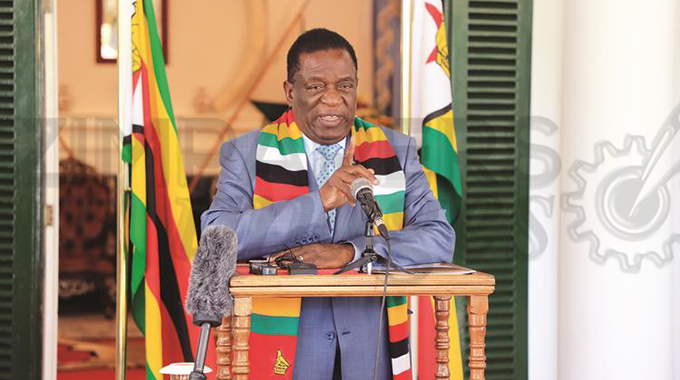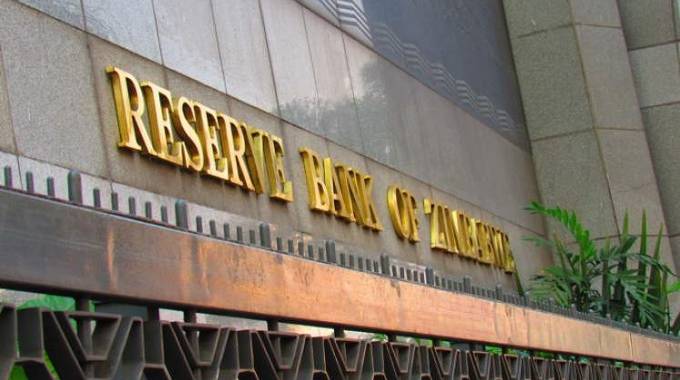Editorial Comment: Investing in agric will end food imports

On August 28, President Mnangagwa outlined a vision to eliminate food imports in the next three to four years through implementation of a cocktail of measures aimed at boosting agricultural productivity.
Speaking after touring a thriving farming venture in Bindura district, the President said through dedication, hard work and national unity Zimbabwe would achieve this milestone.
His argument was that Zimbabwe had vast resources of arable land and water reservoirs to support irrigation and was therefore not supposed to import food.
Sceptics went into overdrive, especially on social media, dismissing the declaration as overambitious.
Events on the ground however, were soon to reveal the stark reality that the Second Republic’s engagement and re-engagement efforts as well as its investment drive, were beginning to bear fruit and in a very big way.
Well thought out and sustainable policies formulated and driven by the Government and implemented in partnership with the private sector and external players, are poised to transform the country into an upper middle income society by 2030, in line with President Mnangagwa’s vision.
Agriculture has been identified as one of the critical sectors whose transformation will be key to achieving the set development targets. Following a working and ultimately successful visit to Eurasia early last year, where a number of investment deals were negotiated and signed, President Mnangagwa this week launched a US$51 million agricultural mechanisation facility involving equipment from Belarus, as the country seeks to expedite the sustainable modernisation and mechanisation of the agriculture sector.
In the first batch of equipment delivered this week were 163 tractors, 19 combine harvesters, 52 seed mills and four lowbed trucks. The entire Belarusian equipment facility will involve 474 tractors, 210 planters, 60 combine harvesters and five lowbed trucks with the rest expected over the next couple of months.
This week, the Government and Belarus also agreed on another US$51 million facility which will see Zimbabwe receiving another 3 000 tractors.
Earlier in July, the Government launched a US$51 million facility for farm mechanisation with American company, John Deere, which expressed desire to expand the programme to US$250 million to include the supply of mining and road construction equipment..
Private banks are involved in funding the US$50 million John Deere scheme, where farmers lease equipment as needed, and this shows Government’s movement away from inefficient models of the past to ensure sustainable financing to mechanisation for maximum agriculture productivity. One of the implementing partners in the John Deere programme, Agribank, will dispatch combine harvesters under a Special Purpose Vehicle facility to provinces to help farmers harvest wheat.
Engagement and re-engagement efforts also saw Government and the European Union (EU) launching the Zimbabwe Agricultural Growth Program Fund in June which is expected to boost the livestock sector, maximise smallholder farmers’ profits and improve competitiveness on domestic and international markets.
The $45 million ZAGP programme mainly targets small to large scale livestock producers, private sector integrators, processors, research organisations, farmers unions and financial service providers among others and will be implemented by EU partners over a four-year period.
ZAGP, which is covering all rural provinces, will address the weaknesses and gaps in the livestock sector that have prevented the industry from growing.
These developments in the past four months alone are a positive indicator that the Government is working hard to deliver on its mandate and promises even in the face of several challenges, including the Covid-19 pandemic.
Late last year, a high-powered delegation from the world’s largest food processing firm, the Switzerland-headquartered Nestle, met President Mnangagwa in Harare and pledged to further invest in the country especially in supporting dairy and coffee farmers.
Government has steadfastly refused to be distracted from its set objectives by naysayers who continue to talk of a so-called crisis in the country and is instead focusing on improving the welfare of the people through various interventions.
So successful has been Zimbabwe’s investment drive in recent months that even companies from countries on the opposite ideological divide, are beginning to explore local business opportunities.
One such company is US industrial behemoth, General Electric, which has been chosen along with Power Construction Corporation of China, to build the US$4 billion Batoka Hydroelectric Power Scheme for Zimbabwe and Zambia on the Zambezi downstream of Victoria Falls.
African countries have also responded positively to “the Zimbabwe is open for business” mantra with Malawi and Equatorial Guinea holding high level talks with authorities in Harare in the past two weeks.
Discussions focused on several areas of cooperation including agriculture, trade, mining and social services.
President Mnangagwa says his administration remains open to ideas, perspectives, opportunities, partnerships and investments to revamp and grow the agriculture sector and the economy at large through robust and responsive policies being implemented with the involvement of all Zimbabweans.
Improving agricultural production for national food security remains the Second Republic’s priority and Zimbabwe will indeed, soon wave goodbye to food imports.








Comments